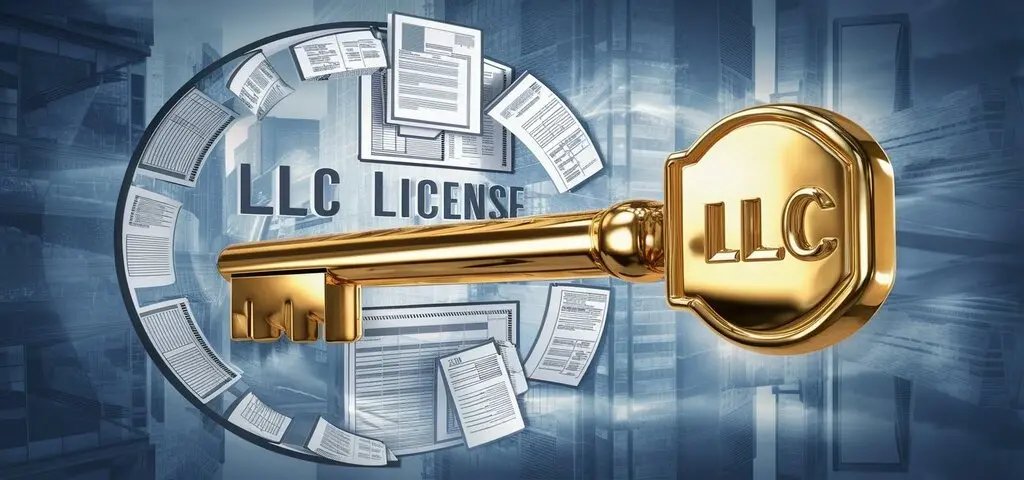
What is an LLC License and what does it include?
The legal establishment of an LLC (limited liability company) requires a business license called a limited liability company license. An LLC license consists of the following general summary:
What is understood by the phrase Limited Liability Company (LLC)?
A limited liability company or LLC is a kind of business form falling between a corporation and a partnership. Like a corporation, an LLC gives its owners limited liability, meaning the owners are not legally liable for the debt of the company or its financial commitments. Operating flexibility, tax system, and less documentation as opposed to regular company creation are provided as a partnership.
Managed by one or more people known as "members," an LLC is a type of corporate structure. While allowing members to control how the company is operated, this type of business structure shields them from personal accountability for the debt of the company. Small enterprises and startups generally use them for their favorable taxation statuses and legal liability protection for the proprietors.
About LLC licenses, what more should you know?
An LLC forms your company legally recognized as a commercial entity registered in the state and with its own legal identity. Usually, you have to turn in something called "articles of organization" to the state where you wish to form your LLC and pay LLC state costs depending on the state. This helps you to obtain a formal LLC license or certificate, therefore validating your ability to operate an LLC-style firm.
Getting an LLC business license is vital for several main reasons.
Obtaining an LLC license is your legal acknowledgment, in the perspective of the state, of your company and your right to start operations. Without it, you run the risk of running into fines, LLC company dissolution, or some personal responsibility issues.
- An LLC greatly helps you secure your house, car, investments, or any other asset should your company be brought to court or sold. But this liability protection caps only as soon as you formally register your LLC.
- Having a licensed LLC gives businesses credibility both socially and legally among banks, suppliers, and consumers. It is a good sign that you have followed legal criteria that have to be satisfied.
- To open company bank accounts as well as to get an employment identification number (EIN) from the Internal Revenue Service for taxation, you must first acquire an LLC license for business operations.
- Having an official LLC certificate helps your company project credibility going forward whether you are looking for investors or financial support.
- Some other licenses and permissions for companies are issued just once the company entity has been formally established. This is what an LLC license satisfies.
Steps in Getting an LLC License
Obtaining an LLC license calls for a few main steps:
1. Legal Formalities
Above all, choose a name for your LLC that would not go against state laws and rules. You will first have to find out whether the name is to be taken or already in use.
2. Organize Files Articles of Organization
Then, with your state's company filing center, create and document a basic document called the "articles of organization." This form just shows basic information about your LLC, including its name and address, members, etc. Most of the states will charge a nominal fee for submitting this form.
3. Form an operating agreement.
This is a legal document covering the terms of ownership, member responsibilities, profit or loss distribution, decision-making authority, and management policies and practices of your LLC. On the side of government, the founding of one is pertinent.
4. Acquire an EIN.
For identification and taxation as well as federal employer identification number (EIN) application from the Internal Revenue Service, you must This is free to use and might feature even a brand logo, a marketing phrase, or a product label.
5. Otherwise, do as advised by State and Local authorities.
After you have obtained the first LLC certificate, your industry, location, and business operations will determine other licenses and permits you may need. Additionally, the company can have paperwork needed for annual reporting that has to be updated.
Stated differently, an LLC license is a legal document establishing your LLC to allow it to register for various licenses such as tax identification numbers, company finance or banking, insurance, and operational licenses. Compliance can be as basic as giving reminders or training that consistently reinforces your limited liability safeguards. To find out all the implications of the newly formed LLC, one is advised to see an attorney and accountant.
Contact us here for accounting services now!

Get Help Fast!
My Accounts Consultant Helps Accounting & Bookkeeping Services help you save money, better understand your business and find the Accounts problems before they hurt you.